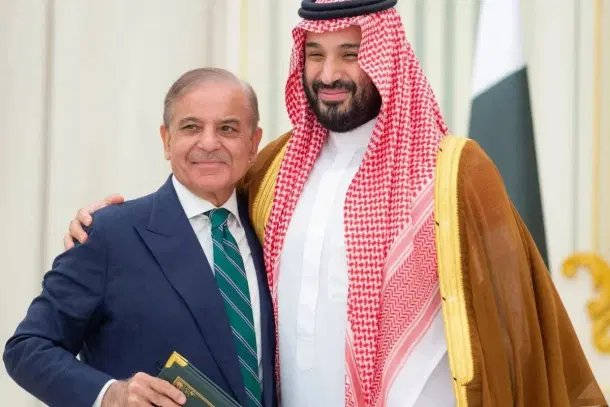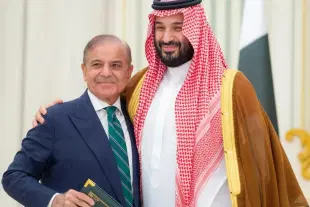World
Saudi-Pakistan Security Pact: Answers To The Most Important Questions Here
Prakhar Gupta
Sep 19, 2025, 11:29 AM | Updated 11:30 AM IST
Save & read from anywhere!
Bookmark stories for easy access on any device or the Swarajya app.


Saudi Arabia and Pakistan signed a “Strategic Mutual Defence Agreement” during Pakistani Prime Minister Shehbaz Sharif’s state visit to the West Asian giant this week.
The pact obliges each side to view an attack on one country as an attack on both. Official Saudi and Pakistani media said the agreement “strengthens joint deterrence against any aggression” and institutionalises decades of defence cooperation.
Historically, Saudi–Pakistan security cooperation runs deep. Saudi Arabia was among the first countries to recognise Pakistan in 1947 and a 1951 Treaty of Friendship laid the groundwork for close ties. Since the 1960s, Pakistan has deployed troops and trainers in the kingdom and trained thousands of Saudi officers.
Riyadh also regularly extends financial support to Islamabad in the form of loans and oil credit as part of this relationship.
The new deal comes amid a volatile regional context. Gulf governments have grown anxious about security after a series of cross-border conflicts and a perceived US pullback. In recent years, Israel’s war on Gaza and its strikes on neighbouring states including the 9 September 2025 Israeli airstrike in Doha have unsettled Arab capitals.
Gulf leaders are increasingly wary of relying solely on the US security guarantor given Washington’s close support for Israel. At the same time India pounded Pakistan military installations in a short conflict earlier this year, threatening to push Pakistan back into the deep economic crisis it has somewhat been emerging out of over the past few months. Observers say the Saudi–Pakistani pact reflects these pressures.
With that context, here are answers to all the questions you may have on the Saudi-Pakistan pact.
1) How has India reacted and was it caught off guard?
Indian officials have been measured in response. The Ministry of External Affairs reiterated that the government was already aware such a pact was under consideration and would study its implications for national security.
Indian media reported that Saudi authorities had kept India in the loop during negotiations indicating Delhi was not completely blindsided.
Political commentators view the timing as driven by broader regional shifts in US retrenchment and Middle East strife rather than a threat to India. In sum, India was not caught entirely off guard and officials have expressed cautious concern vowing to analyse how the pact might affect stability in the subcontinent and the region.
2) Is there a security guarantee involved?
Yes and no. The pact’s headline clause that an attack on one is an attack on both is essentially a mutual-defence pledge. In that sense it does create a form of security guarantee as each side promises to deter or respond to aggression against the other.
However, experts note this is largely political and symbolic. The published statements emphasise joint deterrence and consultation but they do not explicitly oblige Saudi or Pakistan to unconditionally deploy forces whenever the other is attacked.
Observers compare it to NATO’s Article 5 in spirit as it commits partners to mutual support but the exact military response would be decided at the time. Pakistan’s earlier Cold War era defence pacts with the US similarly did not guarantee automatic intervention.
In short, the agreement sets a formal commitment to mutual defence but it stops short of spelling out a binding immediate military action in all cases.
3) Does this pact mean Pakistan will provide Saudi Arabia with a nuclear umbrella?
No, the agreement does not explicitly invoke nuclear weapons. Speculation about a Pakistani nuclear umbrella for Saudi Arabia has circulated for decades particularly as Riyadh has long worried about Iran but analysts emphasise the new pact’s text contains no such clause.
Saudi Arabia has repeatedly stated it will not pursue nuclear arms and Pakistan maintains its arsenal is meant only to deter India.
A senior Saudi official’s remark that all military means are covered in the pact was deliberately vague. Some commentators interpret this as a hint of extended deterrence but most experts stress there is no evidence that Pakistan’s nuclear doctrine has shifted to formally shield Riyadh.
Pakistan certainly possesses missiles with ranges that could threaten adversaries across the region but extending them to Saudi defence would turn its arsenal into a direct target.
Rawalpindi has occasionally invoked the idea of its nuclear capability as a safeguard for the broader Muslim 'umma' yet this has never gone beyond rhetoric and has never been embedded in a binding commitment.
4) What are the exact terms of the agreement and does it require automatic military intervention?
The publicly released language of the pact is general and declaratory. A Pakistani Foreign Ministry statement says the accord aims to develop aspects of defence cooperation and strengthen joint deterrence against any aggression and unambiguously declares that any aggression against either country shall be considered an aggression against both.
However, the text does not lay out specific operational commitments or procedures. In practice this clause would obligate both governments to consult and potentially act in concert if the other is attacked but it stops short of prescribing an automatic war response.
Defence analysts note that historically when Pakistan signed Cold War mutual-defence pacts allied powers still reserved judgment before intervening on Pakistan’s behalf.
Similarly, this pact’s broad formula signals a collective security stance but any actual military deployment would depend on each country’s decision at the time.
Analysts have also pointed out that Saudi Arabia would never want to put itself in a position where it might have to intervene on Pakistan’s behalf in a conflict with India, especially in a shooting war, since that could expose the Kingdom to Indian attacks.
5) If Saudi Arabia would never fight India on Pakistan’s behalf why did Rawalpindi sign such a pact?
There are two main reasons. First is Pakistan’s deep economic dependence on the Kingdom. Riyadh has repeatedly bailed Islamabad out with loans, oil on credit and deposits to stabilise its collapsing reserves. Signing a pact helps Pakistan reassure the Saudis that it remains a loyal partner and earns goodwill that can translate into more cash.
Second is Rawalpindi’s long–standing fantasy of leading the Muslim world under the umbrella of a so–called Islamic NATO with itself in command and its nuclear arsenal as the backbone. The Saudi deal allows Pakistan to pretend this dream is alive even if Arab capitals have no intention of letting it happen. In reality, the pact gives Pakistan prestige on paper but changes little on the ground.
6) Why was the agreement signed now and is it a direct response to Israel’s attack on Qatar?
Officials insist it is not a knee-jerk reaction. Saudi spokesmen emphasise the pact had been negotiated for years and is not a response to specific countries or specific events. Nevertheless the timing is hardly coincidental.
Observers note the deal was sealed days after Israel’s unprecedented 9 September strike on Hamas leaders in Doha which shocked Arab capitals. That attack plus broader flare-ups in Gaza and other fronts has spurred Gulf states to shore up their security outside the US framework. Some analysts say the Qatar incident clearly increased urgency.
Experts caution that such pacts take months to finalise but admit the recent crises likely accelerated Riyadh’s timeline. In sum Riyadh denies this is a personal rebuke to any one state but most commentators view the Qatar strike and America’s perceived passivity as a catalyst that convinced both sides to lock in the agreement immediately.
7) How will this affect KSA’s relations with India especially after the May 2025 conflict?
Saudi officials have been careful to assure India that its relationship with Riyadh remains strong. A senior Saudi source was quoted saying ties with New Delhi are more robust than they have ever been and that cooperation will continue.
Nonetheless, the pact adds a new dynamic. India and Pakistan came close to a wider conflict in May 2025, underscoring how quickly conflict can simmer. Now, Pakistan has formal Saudi backing complicating India’s strategic calculus. New Delhi in recent years has sought good ties with all Gulf states and, interestingly, Prime Minister Modi was in Riyadh in April 2025, when Pakistan gave a go ahead to its proxies for the attack in Pahalgam.
India has been deepening economic and security links with Riyadh. Many analysts say Saudi Arabia will try to balance both relationships but India may feel pressure to hedge by strengthening its own Gulf partnerships. For example India already shares a Comprehensive Strategic Partnership with the UAE, expanded in recent joint defence agreements and the Saudi-Pakistan pact may accelerate those ties as a counterweight.
In practice, India will study the pact’s impact but is unlikely to make sudden moves. It will probably quietly bolster cooperation with friendly Gulf states like the UAE and perhaps Oman while reiterating its own independent security posture.
8) Will this lead to a broader Pan-Islamic or GCC-wide defence alliance with Pakistan at the centre?
No. Talk of Pakistan leading a wider Islamic defence bloc is unrealistic. For years Rawalpindi has dreamed of building an “Islamic NATO” with itself in command, but Gulf monarchies have shown little interest. Saudi Arabia and the UAE rely on Pakistan for troops, trainers and occasional support, but when it comes to strategy they look to Washington, London and increasingly New Delhi, not Islamabad.
The Gulf states also have no desire to be dragged into Pakistan’s quarrels with India, which would expose them to unnecessary risks and threaten their growing economic ties with Delhi. Iran and Israel are further reasons why Arab capitals will not unite under a Pakistani umbrella.
In practice, the most Pakistan can expect are limited bilateral training missions or loans. Its vision of leading a grand Islamic alliance remains a fantasy, not a serious prospect.
9) How might the US react and could it strain Saudi–US ties?
Washington has so far responded quietly. No official US statement was released immediately after the signing. However, American officials are almost certain to monitor the pact closely given Pakistan’s nuclear arsenal and a history of US concerns about Islamabad’s missile programmes. Security analysts say the treaty’s broad terms will raise eyebrows in Washington because it signals Saudi hedging away from US protection. Indeed, Saudi anxiety over the US–Israel alliance is a key driver of the deal.
While the US remains the Gulf’s principal arms supplier and military partner, senior experts caution that the pact could introduce some friction. The US may privately tell the Kingdom to tread carefully. But outright rupture is unlikely as Saudi dependence on US military support persists and Riyadh has stressed that its engagement with Pakistan complements not replaces its American ties.
Prakhar Gupta is a senior editor at Swarajya. He tweets @prakharkgupta.





